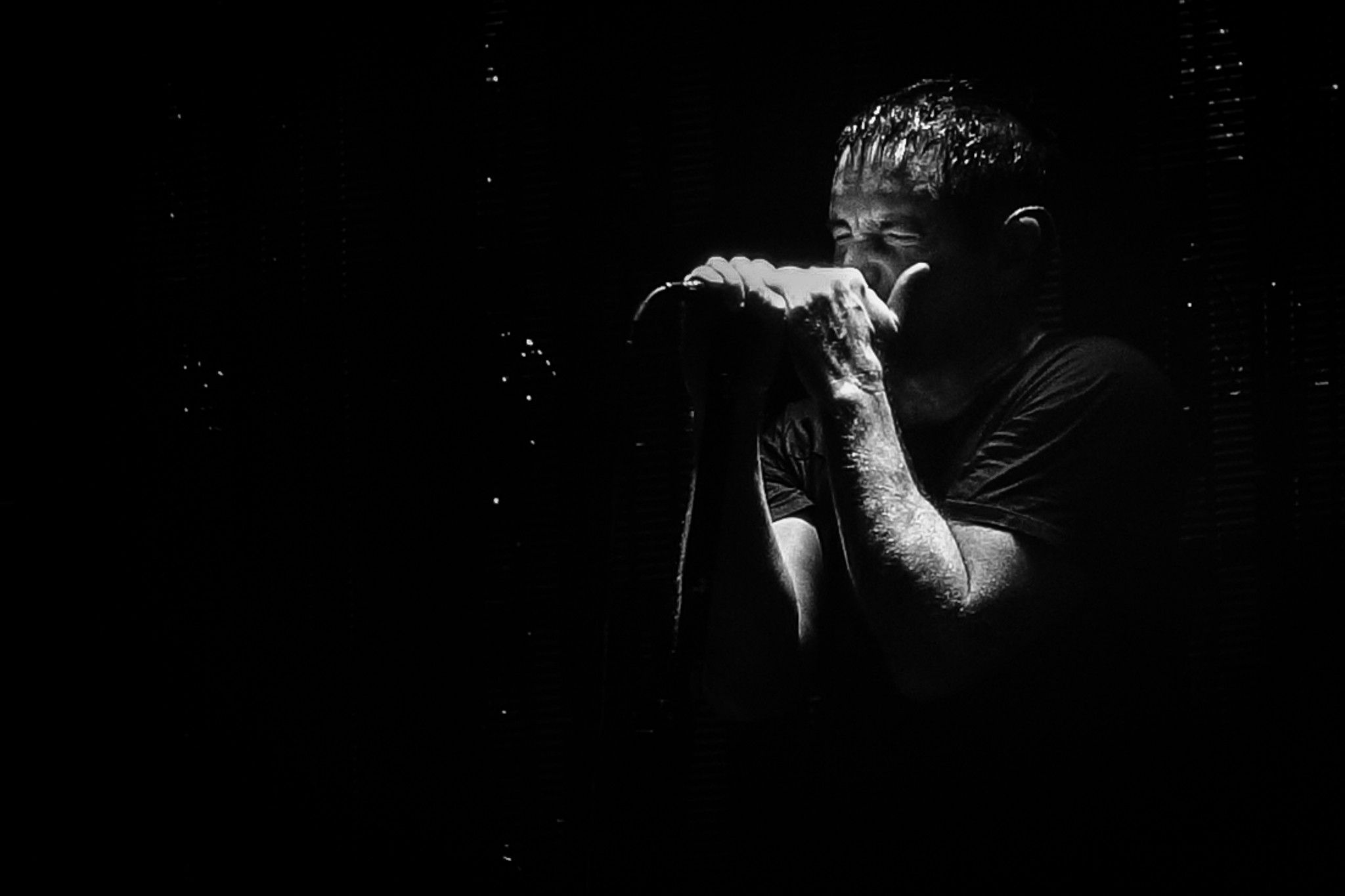A love letter to the lyrics of Hurt by Trent Reznor.
 nine inch nails by Alan (image munky), used under a Creative Commons CC BY-NC 2.0 license.
nine inch nails by Alan (image munky), used under a Creative Commons CC BY-NC 2.0 license.
Hurt is a river.
Trent Reznor is its source. It was written by him, about him, and most likely for him. The lyrics are personal and precise.
At the same time they are wide open to interpretation. The song has become personal and precise to millions of listeners. It is about them and for them. They pour their stories, their circumstances and contexts, their significant other meanings into the stream; millions of micro-confluences each subtly altering the river?s course.
Every tortured soul who interprets the lyrics to their own ends is a tributary that makes the current stronger.
By the time the song meets the sea at Johnny Cash Bay it is deep and dark. Rips, eddies and back-currents of accumulated meaning deposit their silt onto a bed of gravel. The river empties into an ocean of anguish and resignation.
The River Hurt is a river of hurt.
I hurt myself todayTo see if I still feelI focus on the painThe only thing that?s realThe needle tears a holeThe old familiar stingTry to kill it all awayBut I remember everything
The personal significance to Trent Reznor is obvious. This is a drug-induced nadir. The needle that tears a hole is not a metaphor. Hurt is an ode to rock bottom. His lyrics and his rendition of the song are cold and metallic. To me he sings naked, from a foetal position. He is shivering in a damp cell. There is white noise and discord. There is profound illness.
At source – at Trent Reznor – Hurt is fragile and, for all its pestilence, it has a matter of fact purity. He is not looking for sympathy. His Hurt is a status report. Situation: desolate. Outlook: bleak. Soundscape: industrial.
What have I becomeMy sweetest friendEveryone I know goes awayIn the endAnd you could have it allMy empire of dirtI will let you downI will make you hurt
Is that a chorus? Or a repeated verse? To describe it as a chorus would be to raise expectations of a rousing interlude that is entirely at odds with the unremitting nihilism of Reznor?s Hurt, although there is more than a hint of defiance in his delivery of the second stanza.
Whether chorus or verse, it is a stripped-bed description of the self-destructive impulses that attend the abandonment of hope. The time when you are most in need of support is the time when you are most likely to reject and repel those who are most willing and able to provide it.
I wear this crown of shitUpon my liar?s chairFull of broken thoughtsI cannot repairBeneath the stains of timeThe feelings disappearYou are someone elseI am still right here
Hurt belongs to its audience in much the same way as R.E.M.?s Everybody Hurts belongs to its.
?That?s exactly how I feel about that song. The second it went out, it wasn?t ours,? said Michael Stipe.
Both Stipe and R.E.M. guitarist Peter Buck have talked about how they avoided metaphors in the lyrics of Everybody Hurts to make it accessible to teenage audience.
Deliberately or not, Reznor does the same for Hurt. His crown of shit and his liar?s chair are the most figurative images conjured by the lyrics. The rest of the song is a brutalist architecture of degradation.
Ironically there are two lines which could be a metaphor for the song itself, and for the process by which it stopped being Reznor?s song and came to belong to everyone else.
And you could have it allMy empire of dirt
You can have this song. Take this ragged self-abasement. Bend it to your own ends.
Johnny Cash did just that. In what was both an act of appropriation and an appropriate act, he made the song his.
His recording is strikingly different to the Nine Inch Nails original. Reznor whispers then rails. Cash resigns. Reznor is fucked up. Cash is frail.
Reznor delivers a cautionary tale about addiction. Cash delivers a sermon on mortality.
What Hurt meant to Johnny Cash is between him and his maker. Confession? Self-exorcism? Mortal coil exit interview? The words spill from his mouth as if it means a lot, perhaps everything.
And the video is enough to make Steven Spielberg and John Williams eat their hearts out. It leaves no emotional or nostalgic stone unturned. It mangles every drop of empathy out of its audience. It deftly needles every sentimental pressure point.
It is a brilliant act by a master storyteller. It is a Shakespearean tragedy set to acoustic guitar. It is worthy of an Olivier or a Tony Award if a suitable category could be created. It is fabulous.
But there is a whiff of artifice. There are moments of melodrama.
The wringing of the hands. The shake of the head. The wanton pouring of the wine. The big arm gestures. It is theatre.
Several commentators have referred to Johnny Cash as a misplaced preacher. And them preachers ain?t no strangers to a bit of hyperbole and melodrama if it helps that there yarn get spun.
If I could start againA million miles awayI would keep myselfI would find a way
Reznor himself was moved by and highly respectful of the Johnny Cash cover.
I pop the video in, and? wow. Tears welling, silence, goose-bumps? Wow. I just lost my girlfriend, because that song isn?t mine anymore. Then it all made sense to me. It really made me think about how powerful music is as a medium and art form. I wrote some words and music in my bedroom as a way of staying sane, about a bleak and desperate place I was in, totally isolated and alone. Some-fucking-how that winds up reinterpreted by a music legend from a radically different era/genre and still retains sincerity and meaning – different, but every bit as pure.
I take issue with that last observation. The Cash version is many things but I don?t think it is as pure as it was at source. And this is heresy but, for that reason, I prefer the Nine Inch Nails original.
Hurt belongs to everyone. Therefore it belongs in part to me. And, to the extent that it is in my gift, I?d like to give it back to Trent Reznor.
If you like this please recommend it below.
A Longing Look is also on Twitter.
If you liked Trent Reznor, you?ll probably like Nick Cave too.
Thank you.


